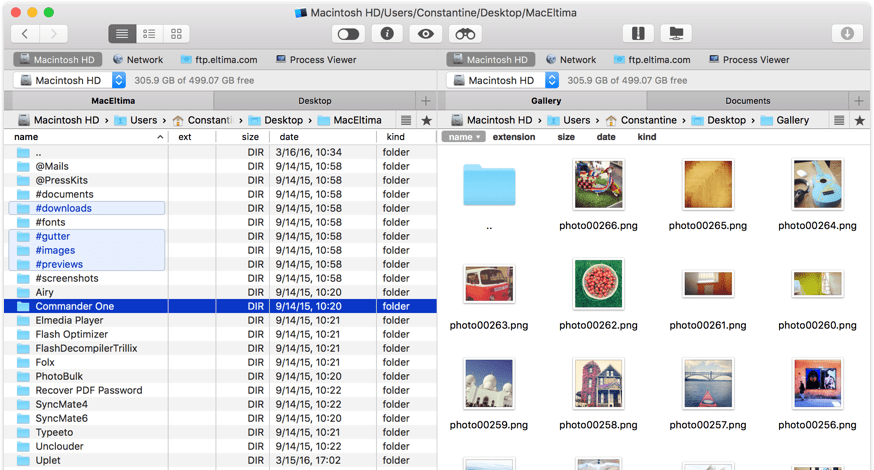
It’s easy to observe that Δ between timings is almost constant and represents the difference between times spent in the management tasks. On the provided data sets range, the CoreFoundation+CFStackAllocator implementation variant is 20%-50% faster than the pure Objective-C implementation and is 7%-20% faster than the pure CoreFoundation implementation. These functions were called with the same data set consisting of 1,000,000 randomly generated strings with varying lengths. struct CFStackAllocator Īnd here are the results. The internal state of the allocator consists of the stack itself, a stack pointer, two allocations counters for diagnostic purposes and the CFAllocatorRef pointer. The only public method, apart from the constructor and the destructor, provides a CFAllocatorRef pointer to pass into CoreFoundation APIs.
Fastcommander mac code#
The stack-based allocator is conceptually a classic C++ RAII object. It’s assumed that the client source code will be compiled as C++ or as Objective-C++. In such case, allocations will be blazingly fast most of the time, while it’s still possible to process requests for big memory chunks. As for the third issue, it falls onto the developer, since the memory allocator can only help with some diagnostic. It’s incredibly easy to write such memory allocator, main steps are described below. Do increase a stack pointer on allocations, don’t decrease it upon deallocations.

Use a stack memory when possible, fall back to a generic-purpose memory allocator otherwise.To mitigate these issues, a compromise strategy exists: All allocated objects must be freed before an escaping out of allocator’s visibility scope, otherwise, an access to the “leaked” object will lead to an undefined behavior.In a perfect world, however, it would be great to have an O(1) time complexity for both allocation and deallocation. Deallocating a stack-based memory in an arbitrary order is painful and requires some time to manage.A typical program, which does nothing tricky, is very unlikely to hit the stack limit, but that’s not an advice to carelessly use alloca() everywhere – it will strike back eventually.

But there are some issues with a stack-based allocation: Nothing is faster than allocating memory on the stack, obviously. Suppose we want to spend as less time on memory allocation as possible. There’re plenty of optimization techniques developed for such tasks, so why not check it on Cocoa? Traditionally, the Achilles’ heel of generic-purpose memory allocators is a dealing with many allocations and consequent deallocations of small amounts of memory.

Introducing any additional low-level components also implies some maintenance burden in the future, so there should be some heavy pros to bother with a custom memory allocation. “What for?” might be a reasonable question here.

So, it’s absolutely ok to use a custom memory allocator on the CoreFoundation level. CoreFoundation also provides a set of APIs to manipulate the allocation process:Īn overall mechanics around CFAllocatorRef is quite well documented and, even better, it’s always possible to take a look at the source code of CoreFoundation. On CoreFoundation level, many APIs accept a pointer to a memory allocator (CFAllocatorRef) as the first parameter. kCFAllocatorDefault or NULL is passed to use the default allocator, i.e. Swift, on the other hand, AFAIK doesn’t even pretend to provide any allocation options. On Foundation level, Objective-C once had some options to customize the allocation process via NSZone, but they were discarded upon a transition to the ARC. It’s a good challenge for educational purposes, but almost never this will bring any performance benefits. Any C++ Jedi knows about custom allocation strategies, such as memory pools, buddy allocation, grow-only allocators, can write a generic-purpose memory allocator (probably quite a crappy one) and so forth.ĭoes it help? Sometimes usage of a custom allocator allows tuning up an application’s performance, by exploiting a specific knowledge about properties of the system.ĭoes it mean that it might be a good idea to write your own malloc() implementation? Absolutely not. Such mess might surprise folks who use other user-friendlier languages, especially languages with a garbage collection. The language itself provides various object allocation types. Any seasoned C++ programmer knows that object allocation does cost CPU cycles, and may cost lots of them.


 0 kommentar(er)
0 kommentar(er)
